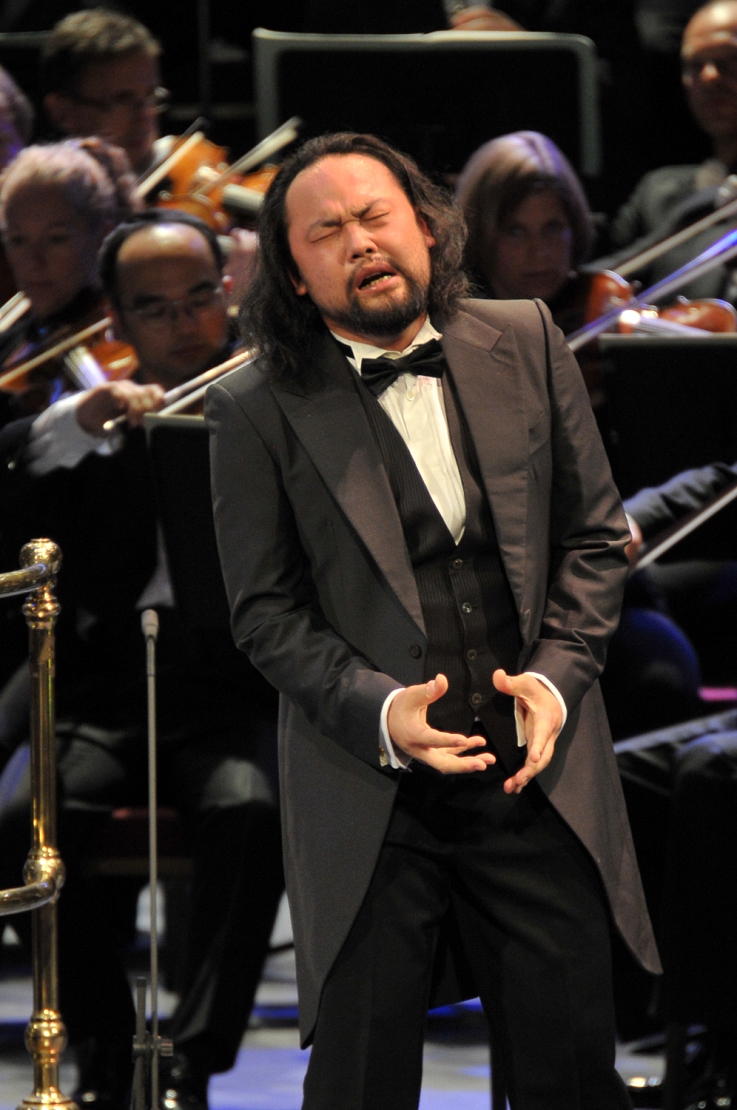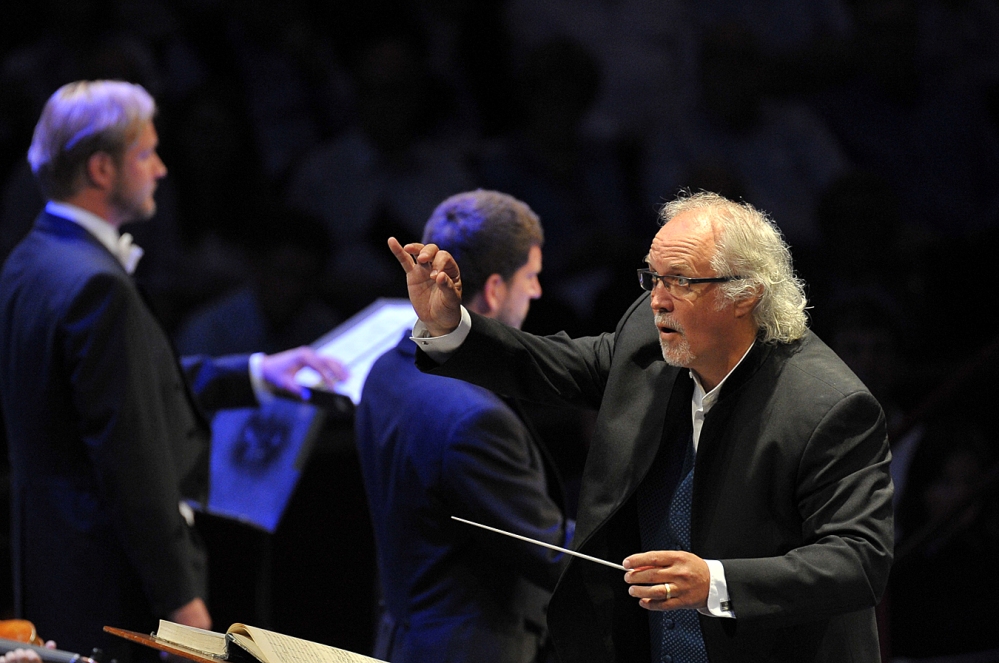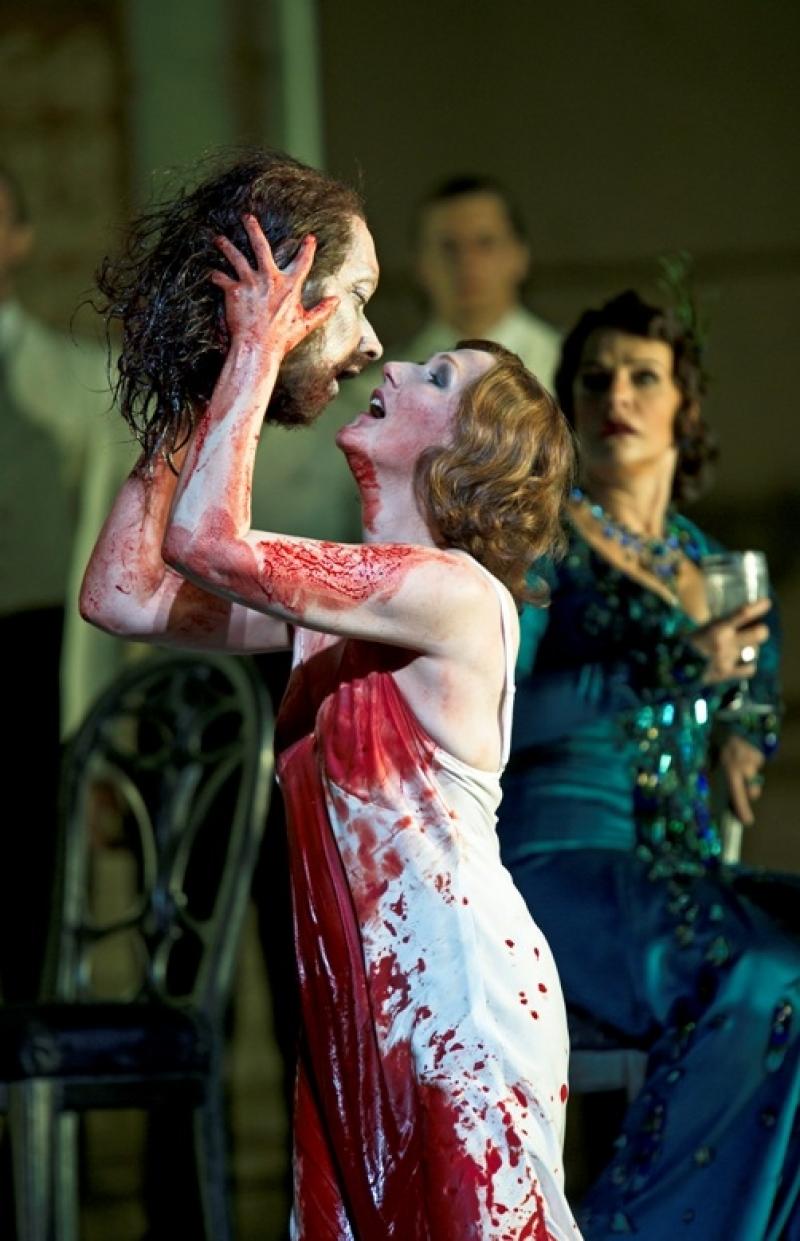Prom 58: Salome, Deutsche Oper Berlin, Runnicles | reviews, news & interviews
Prom 58: Salome, Deutsche Oper Berlin, Runnicles
Prom 58: Salome, Deutsche Oper Berlin, Runnicles
Nina Stemme stuns in a giddying account of Strauss's incredible score
So here’s where I join the ranks of Old Opera Bores by declaring this Salome, Nina Stemme, the best I’ve seen since Hildegard Behrens in 1978, and this Salome as in Richard Strauss’s Wilde opera from Donald Runnicles and his Deutsche Oper Berlin ensemble categorically the most near-perfect. It’s also the first time I’ve had a group of very loud, rude people behind me shouting “sit down” when I stood at the end (and John the Baptist’s God knows I don’t do that often).
But those of you who weren't in the hall will want to know what it was actually like, not least visually since this, of all Proms, isn’t to be televised. After his less-is-more semi-stagings of Wagner with minimal means last year, trumping Bayreuth for the bicentenary, Justin Way has charge of the manoeuvres in the second and third Strauss operas at the Proms in 150th anniversary year. This time, some were singing from scores on stands, which only slightly compromised Burkhard Ulrich’s Herod on the verge of a nervous breakdown – character rather than heroic tenor, but never overdoing the funny-peculiar business; somehow the buttoned-up approach and the DJs of the other score-bound men made sure that wife Herodias – Doris Soffel, the would-be prima donna with her moments in the moonlight – and stepdaughter Salome, Stemme inevitably upstaging mama, had real command of the platform. Their top notes, incidentally, were matched by a major presence in a smaller role, Ronnita Miller as the "Page" who warns lovestruck Narraboth (Thomas Blondelle, as lustrous as any in the only romantic-tenor role) in an opening scene which immediately announced the levels of meaningful commitment.

A rim of moon on the LED strip at the back of the platform changed to green and later blood red, which gave us more of Oscar Wilde’s dominant, much invoked presence – Strauss sets most of the original text – than many productions. No props were needed. The cast left the stage for Salome’s Dance, Deutsche Oper soloists including supremely artistic flute, conjuring a levitational delicacy complete with feminine endings when the orientalia turns Viennese-waltzy, and Stemme addressed her "transfiguration through love" compellingly to thin air, conjuring up a severed head as consummately as a first-class Macbeth conjures up an invisible-to-all-others Banquo's ghost.
No limitations bound Stemme’s total assumption. Slinking down from the side steps in a star-spangled black dress, she instantly invoked the spoilt adolescent, first petulant and then obsessive, with authoritative chest voice already at scary odds with both that and the diaphanous orchestral wraps. Hers is one of those rare dramatic sopranos with whom you know you can feel secure in the insane demands on the top of the range and the over-arching phrases: she knows what to do, at every point. And if in the past I think I’ve noted the seams, dramatic characterization and musical expression were absolutely as one last night.

Runnicles (pictured above) understands when to tense, release or glide, and how to drop the orchestral levels on the entry of a voice; none of the key moments failed to give goosebumps. After his disappointing Mahler Ninth with an under-engaged BBC Scottish Symphony Orchestra earlier at this year's Proms, this was a return to the total mastery of last year’s Tannhäuser. The overriding impression was one of delicate femininity in ferment. And if this was all about the moon and a love-drunk (or sex-drunk) woman treading the skies, tonight’s Elektra ought to be glaring sun versus blackest night, masculine hard edges – a difficult task to achieve in the Albert Hall. But with this venue, you never can tell. At any rate it did the shot-silk cadences of Salome as proud as the whole ensemble.
MORE RICHARD STRAUSS ON THEARTSDESK
Der Rosenkavalier, Royal Opera (2009). Uneven revival of John Schlesinger’s 25-year-old production
Capriccio, Grange Park Opera (2010). Lively staging, stylish singing and a welcome intrusion of wartime reality
Salome, Royal Opera (2010). Angela Denoke's mercurial Salome (pictured below by Clive Barda) shimmers in Strauss's monstrously beautiful opera
Ariadne auf Naxos, Welsh National Opera (2010). Hoffmansthal's libretto is all about fidelity. This updating is faithful, up to a point
 Intermezzo, Scottish Opera (2011). Soprano Anita Bader graces a Klimtian take on Richard Strauss's domestic comedy
Intermezzo, Scottish Opera (2011). Soprano Anita Bader graces a Klimtian take on Richard Strauss's domestic comedy
Die Frau ohne Schatten, Mariinsky Opera (2011). Strauss's massive fairy tale makes a rare outing in Gergiev’s musically strong venture at the Edinburgh Festival
Der Rosenkavalier, English National Opera (2012). David McVicar and Edward Gardner deliver a riveting account of Strauss's popular opera with Amanda Roocroft as the Marschallin
Intermezzo, Buxton Festival (2012). Fine style in Strauss's comedy-with-feeling
Ariadne auf Naxos, Glyndebourne Festival Opera (2013). Strauss's opera reluctantly enters the Battle of Britain courtesy of a young German director
Capriccio, Royal Opera (2013). Renée Fleming leads superlative cast in concert performance of Strauss's operatic debate
Elektra, Royal Opera (2013). Revival with Christine Goerke in the title role hits the horrid heart of the matter in Strauss's poleaxing masterpiece
Die Frau ohne Schatten, Royal Opera (2014). Compelling dream-interpretation of Strauss's myth graced by fine singing and Semyon Bychkov’s conducting
Der Rosenkavalier, Glyndebourne (2014). Richard Jones finds new order in rococo comedy for music, with Kate Royal as the Marschallin
Ariadne auf Naxos, Royal Opera (2014). Two nymphs are the real revelation in this revival of evergreen hybrid
Salome, Symphony Hall, Birmingham (2015). Lise Lindstrom steals the show from Karabits and Bournemouth SO as a sensual Strauss anti-heroine in concert
Der Rosenkavalier, Royal Opera (2016). Robert Carsen's handsome production with Renée Fleming is elevated by superb orchestral playing
Add comment
The future of Arts Journalism
You can stop theartsdesk.com closing!
We urgently need financing to survive. Our fundraising drive has thus far raised £49,000 but we need to reach £100,000 or we will be forced to close. Please contribute here: https://gofund.me/c3f6033d
And if you can forward this information to anyone who might assist, we’d be grateful.

Subscribe to theartsdesk.com
Thank you for continuing to read our work on theartsdesk.com. For unlimited access to every article in its entirety, including our archive of more than 15,000 pieces, we're asking for £5 per month or £40 per year. We feel it's a very good deal, and hope you do too.
To take a subscription now simply click here.
And if you're looking for that extra gift for a friend or family member, why not treat them to a theartsdesk.com gift subscription?
more Opera
 Orpheus and Eurydice, Opera Queensland/SCO, Edinburgh International Festival 2025 review - dazzling, but distracting
Eye-popping acrobatics don’t always assist in Gluck’s quest for operatic truth
Orpheus and Eurydice, Opera Queensland/SCO, Edinburgh International Festival 2025 review - dazzling, but distracting
Eye-popping acrobatics don’t always assist in Gluck’s quest for operatic truth
 MARS, Irish National Opera review - silly space oddity with fun stretches
Cast, orchestra and production give Jennifer Walshe’s bold collage their all
MARS, Irish National Opera review - silly space oddity with fun stretches
Cast, orchestra and production give Jennifer Walshe’s bold collage their all
 Káťa Kabanová, Glyndebourne review - emotional concentration in a salle modulable
Janáček superbly done through or in spite of the symbolism
Káťa Kabanová, Glyndebourne review - emotional concentration in a salle modulable
Janáček superbly done through or in spite of the symbolism
 Buxton International Festival 2025 review - a lavish offering of smaller-scale work
Allison Cook stands out in a fascinating integrated double bill of Bernstein and Poulenc
Buxton International Festival 2025 review - a lavish offering of smaller-scale work
Allison Cook stands out in a fascinating integrated double bill of Bernstein and Poulenc
 Tosca, Clonter Opera review - beauty and integrity in miniature
Happy surprises and a convincing interpretation of Puccini for today
Tosca, Clonter Opera review - beauty and integrity in miniature
Happy surprises and a convincing interpretation of Puccini for today
 Hamlet, Buxton International Festival review - how to re-imagine re-imagined Shakespeare
Music comes first in very 19th century, very Romantic, very French operatic creation
Hamlet, Buxton International Festival review - how to re-imagine re-imagined Shakespeare
Music comes first in very 19th century, very Romantic, very French operatic creation
 Falstaff, Glyndebourne review - knockabout and nostalgia in postwar Windsor
A fat knight to remember, and snappy stagecraft, overcome some tedious waits
Falstaff, Glyndebourne review - knockabout and nostalgia in postwar Windsor
A fat knight to remember, and snappy stagecraft, overcome some tedious waits
 Salome, LSO, Pappano, Barbican review - a partnership in a million
Asmik Grigorian is vocal perfection in league with a great conductor and orchestra
Salome, LSO, Pappano, Barbican review - a partnership in a million
Asmik Grigorian is vocal perfection in league with a great conductor and orchestra
 Semele, Royal Opera review - unholy smoke
Style comes and goes in a justifiably dark treatment of Handelian myth
Semele, Royal Opera review - unholy smoke
Style comes and goes in a justifiably dark treatment of Handelian myth
 Le nozze di Figaro, Glyndebourne review - perceptive humanity in period setting
Mostly glorious cast, sharp ideas, fussy conducting
Le nozze di Figaro, Glyndebourne review - perceptive humanity in period setting
Mostly glorious cast, sharp ideas, fussy conducting
 Fidelio, Garsington Opera review - a battle of sunshine and shadows
Intimacy yields to spectacle as Beethoven's light of freedom triumphs
Fidelio, Garsington Opera review - a battle of sunshine and shadows
Intimacy yields to spectacle as Beethoven's light of freedom triumphs
 Dangerous Matter, RNCM, Manchester review - opera meets science in an 18th century tale
Big doses of history and didaction are injected into 50 minutes of music theatre
Dangerous Matter, RNCM, Manchester review - opera meets science in an 18th century tale
Big doses of history and didaction are injected into 50 minutes of music theatre

Comments
This is the first Salome I
So it seems I'm not the only
So it seems I'm not the only one who can't sleep for the charge-up of it all. 21st century indeed: you should see the blood in David McVicar's Royal Opera production on DVD (though I can't recommend the Salome).
And you think you were lucky to get it for £20: think of the Arena standees who were closest to one of the great performances for a mere £5. This might be the place to add that I took the godson (21), his first Salome, and he was so riveted that he didn't use the libretto. I think - though of course I know it as he did not - that much would have been apparent in the delivery.
I was at the prom, and I